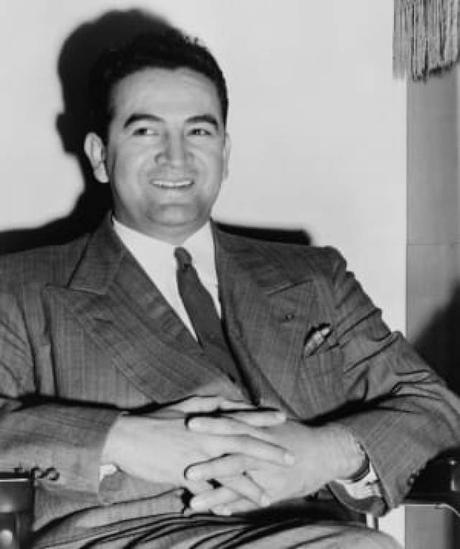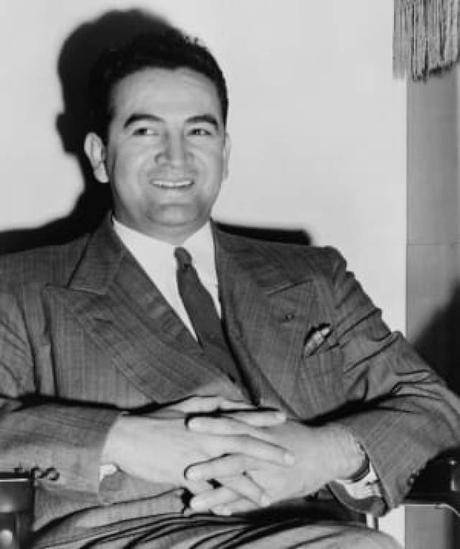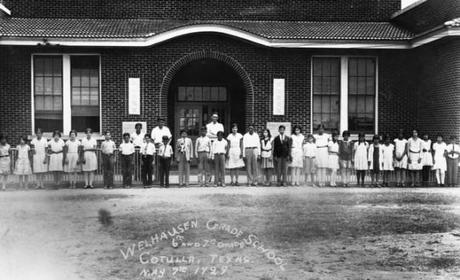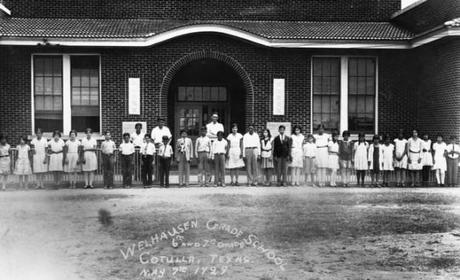"White people won't like it."
When a funeral home in a small town in Texas, using those words, refused to hold a vigil for decorated World War II veteran Felix Longoria, the controversy that followed propelled the Mexican civil rights struggle. Americans on the national stage - with the help of an uprising. US Senator named Lyndon Johnson.
Private Longoria, a Mexican American soldier from Three Rivers, Texas, was tracking down Japanese soldiers retreating from Luzon Island in the Philippines when a sniper shot him dead months before the end of WWII global. His heroic actions posthumously earned him the Purple Heart and other military medals.
It took the US military four years to bring his body back to Three Rivers. When his widow Beatriz Longoria went to make arrangements at the only funeral home in town, they offered to bury him in the "Mexican section" of the cemetery, separated by barbed wire. But they told Ms Longoria that the vigil could not be held in the funeral home as it would anger the white citizens of the city.
The local Mexican-American community and its many WWII veterans, tired of being treated like second-class citizens, were furious. Dr Hector Garcia, chairman of the new veterans civil rights group, American GI Forum, sent letters and telegrams to state and local authorities condemning the discrimination against a Mexican American soldier who gave his life in the service of his country. He sent another telegram to US Senator Lyndon B. Johnson on January 10, 1949.
At a protest meeting the following night, which drew some 1,000 people, Senator Johnson's swift response, which arrived by telegram, was read: "I deeply regret to hear that the prejudices of some individuals have grown. even extend beyond this lifetime, "Johnson wrote. "This injustice... is deplorable."
The first-year senator went on to say that he arranged for Longoria's burial at Arlington National Cemetery, making him the first of an estimated 450,000 Mexican Americans who fought in World War II to receive the honor. At the burial on February 16, 1949, Johnson, his wife "Lady Bird" and a representative of President Harry Truman stood next to Longoria's family as military musicians played "Onward Christian Soldiers".
The discrimination Longoria had suffered, even in death, made national headlines. Columnist Walter Winchell, for his part, said, "The state of Texas, which is so important on the map, looks very small tonight."
Correcting this injustice has sparked an appetite for more. "Garcia and Johnson were both exceptionally insightful leaders who immediately saw that the Longoria affair could have national implications - Garcia for the Forum and LBJ for LBJ, who knew he would be on the right side of history," said Julie Leininger Pycior, author of LBJ and Mexican Americans: the paradox of power.
READ MORE: The surprising role Mexico played in World War IIThe GI Forum fight takes off
For Mexican Americans in the American Southwest, the controversy sent Garcia's main message to this pioneering movement: They were as American as everyone else - and as such, they had to fight to claim their rights. With the founding chapter of the GI Forum in Corpus Christi less than a year old, Garcia took to the highways in his blue Cadillac to help veterans organize 40 new chapters in Texas, New Mexico and Colorado.


Everett Collection
A surgeon in six European combat zones upon his return from WWII, Garcia quickly saw what he and other Mexican American veterans were facing when he opened a clinic with his brother in a neighborhood in Corpus. Christi: Neglect and benefit from veteran delays. Administration. Poverty wage and huts without running water for migrant workers under the government's Bracero program. Shabby and segregated schools for their children.
The GI Forum has raised money to pay Texas Election Tax to get hundreds more of its members to vote. Their struggle for improvement and against discrimination began to gain national attention. To 1951 look magazine article, "Texas's Forgotten People, " showed how childhood diarrhea, diphtheria and tuberculosis have ravaged many of the 1.5 million Mexican Americans who "live on hope."
Teaming up with the League of United Latin American Citizens (LULAC), the GI Forum successfully argued in the United States Supreme Court that having an all-white jury denied murderer Pete Hernandez equal protection before the law. The decision in the landmark Hernandez v. Texas case effectively extended the protection of civil rights laws to Hispanics and all other non-white groups.
The two organizations teamed up again the following year to begin successfully tackling the segregation of Mexican and Mexican American children in four school districts in South Texas.
READ MORE: The Mendez family fought school segregation 8 years before Brown v. Board of EdMexican-American rights make themselves known
The 1960s brought the GI Forum to a more national - and more political - stage in its struggle for civil rights. Garcia has become national coordinator of Viva Kennedy! From Senator John F. Kennedy! campaign to deliver a large block of votes in Texas. After President Kennedy was assassinated in Dallas in 1963 and Vice President Lyndon Johnson was sworn in, the GI Forum won a friend in the Oval Office.
When Johnson declared his war on poverty agenda in January 1965, he cited as inspiration his college days teaching extremely poor and starving students at an all-Mexican school in Cotulla, Texas. "In my wildest dreams, it never even occurred to me that I might have the chance to help the sons and daughters of these students and help people like them all over this country." Johnson told the nation. "But now I have this chance, and I will tell you a secret." I plan to use it. "


Corbis / Getty Images
The "weapons" he deployed in this war: creation of Medicare and Medicaid, the Head Start program for early childhood and work-study programs; extend social security benefits; make food stamps permanent; and send more federal funds to poor schools.
But the appointment of Mexican-Americans to high-level positions in civil rights and economic development - something the U.S. GI Forum demanded - came late in Johnson's tenure, sometimes straining them. relations between Garcia and the president. After vocal protests from Garcia and his group, Johnson appointed another Forum member to the Equal Employment Opportunities Commission. Garcia was appointed to the US Commission on Civil Rights and as Special Representative and Ambassador to the United Nations, tasked with improving relations with Latin America.
Meanwhile, Johnson's historic civil rights and voting rights accomplishments in the mid-1960s seemed to focus more on African Americans, and the carnage of the Vietnam War on American television screens turned the focus away. His attention. The struggles of Mexican Americans to end terrible living conditions and segregation, and to join the struggle of agricultural workers for better wages and working conditions, have fallen behind in Washington.
READ MORE: US Deported Over One Million Of Its Own Citizens In Mexico During The Great DepressionMexican-American activism is evolving
When war and continuing civil unrest led Johnson to announce in March 1968 that he would not stand for re-election, the people of South Texas knew they were losing a friend in the White House. Newer, younger, and increasingly visible - and vocal - Chicano civil rights groups have emerged, decrying the war and advocating Chicano (American Mexican) nationalism.
Some of the goals were the same, but theirs was a drastically different message from the previous generation's claim to activists for their rights as postwar Americans and patriots. After Johnson's departure, the American GI Forum continued its activism into the 1970s; today they still stand up for veterans and raise awareness at work.
In recognition of this pioneering post-war Mexican-American civil rights movement, President Ronald Reagan awarded Garcia the Presidential Medal of Freedom in 1984, the country's highest civilian honor.
"Alone or with help, he was going to end discrimination against Hispanics," Garcia's brother Xicotencatl P. Garcia said. "It's one of those things that you wonder, what kind of a vision is this? The problem is so huge. But that's the vision he had.
READ MORE: What is the Chicano movement?